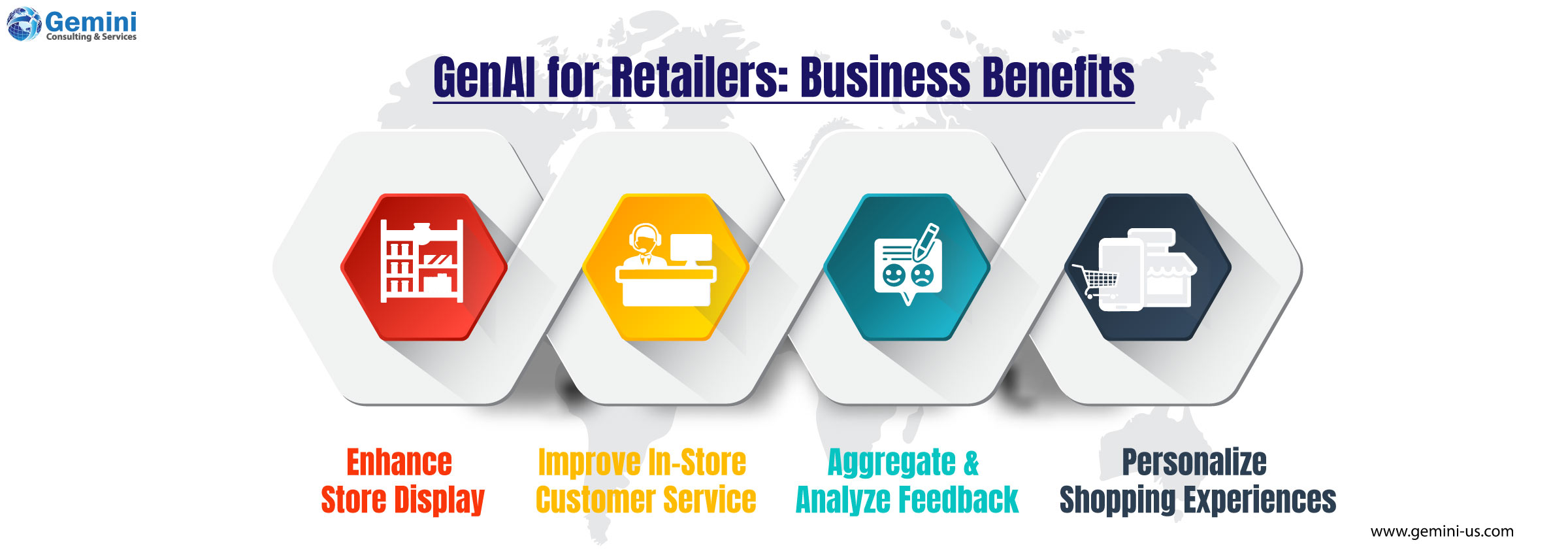Top retailers are exploring generative AI as a potential solution to some of the sector's most significant challenges. They are utilizing this technology to produce product descriptions and other content for websites, generate conversational responses for customer and employee interactions, tailor marketing efforts, and even synthesize customer reaction to improved product offerings and marketing strategies.
Despite the promise, many businesses experimenting with generative AI have encountered less-than-expected outcomes. This isn’t due to inherent flaws in the technology, but rather because generative AI’s learning ceases once its training is complete. As a result, AI may provide misleading information. This is also called hallucination by AI. To address this, retailers are implementing methods like Retrieval-Augmented Generation (RAG) to provide the AI with more precise information for each prompt, improving the accuracy of its responses to queries.
According to Fortune Business Insights, the retail sector's AI market is projected to grow from $9.36 billion in 2024 to $85.07 billion by 2032. This growth represents a Compound Annual Growth Rate (CAGR) of 31.8% throughout the forecast period. The rising adoption of AI-driven voice and visual search technologies to enhance the shopping experience is anticipated to drive the growth of AI in the retail industry.
In this context, Gemini Consulting & Services can help retailers to overcome initial hurdles with generative AI and discovering innovative ways to leverage this technology.

What Is Generative AI?
Generative AI is a branch of artificial intelligence designed to understand and process natural language inputs and create outputs such as text or images. It can also analyze extensive datasets to create summaries and make informed suggestions based on the data it processes.
Key Insights
- Generative AI assists retailers in gaining deeper insights into customer behavior by analyzing order histories, enhancing their ability to provide relevant responses and create customized shopping lists.
- Retailers use generative AI to craft various types of content, including product descriptions for online platforms, catalogs, shelf displays, blog entries, and personalized marketing emails.
- This technology elevates “social listening” by summarizing customer feedback from diverse sources such as social media, product review sites, and call center interactions, thus refining the feedback loop.
- Retailers use chatbots integrated with GenAI to improve procurement processes, bring down expenses and reduce human labor.
How GenAI Will Transform Retail?
GenAI has the potential to revolutionize the retail sector by enhancing how retailers engage with their current customers to boost sales and profit margins. It might even counteract the long-standing issue of declining customer loyalty by enabling exceptionally high-quality customer service.
Retailers are adopting GenAI and analytics tools to refine their marketing strategies, make better pricing and inventory decisions, optimize store layouts and locations, improve product descriptions, and generally enhance the shopping experience to increase profitability. Gemini Consulting & Services can assist in leveraging GenAI to offer personalized and interactive shopping experiences while gaining deeper insights into consumer behavior and preferences. Contact us to know how GenAI can assist your retail business to improve customer experience.

Here are a few ways GenAI can benefit retailers:
- Enhance Store Display: Retailers can boost the appeal of their physical store displays by incorporating smart display technology, utilizing AI for analyzing sales data, and leveraging Generative AI’s conversational capabilities to craft more impactful promotional content and designs.
- Improve In-Store Customer Service: Not every employee may naturally excel at customer interaction, but with a tablet, any staff member can access GenAI for assistance. GenAI can guide customers to specific items, suggest related products, and even prompt staff to ask questions that could uncover additional sales opportunities.
- Aggregate and Analyze Feedback: GenAI can compile and interpret customer feedback from various sources, including social media, call center interactions, and online reviews, producing concise summaries from extensive data. This helps management stay informed about store performance, including service quality, product range, and customer satisfaction.
- Personalize Shopping Experiences: By using GenAI, retailers can create customized offers and marketing messages for individual customers rather than targeting broad demographic groups. GenAI's ability to analyze browsing and purchasing behaviors allows for highly tailored product recommendations and promotions. Additionally, combining GenAI with tools like RAG for real-time data can enhance after-sales service, improve the returns process, and foster interest in future purchases.
Advantages of Generative AI in Retail
Generative AI (GenAI) helps retailers to improve the efficiency of their operations and provide better customer experience. Here’s an in-depth look at how it can be advantageous:
Enhance Operational and Cost Efficiency
Retailers often operate with tight profit margins, so enhancing operational efficiency can significantly boost profitability. GenAI can replace or support customer service agents both online and by phone, minimizing the time staff spend on routine tasks like returns or exchanges. Additionally, GenAI can improve employee productivity and reduce turnover by creating training videos with interactive scenarios, aiding in employee development.
Boost Customer Loyalty
Customer loyalty in retail has been declining for years, making it crucial for retailers to work harder to retain their customers. GenAI helps by analyzing individual customer data to create highly targeted marketing efforts, such as personalized emails and other communications, that are beyond the capability of manual processes. By sifting through shopping histories, social media, and other data sources, GenAI can offer personalized experience to shoppers, thereby, reducing brand fatigue and enhancing customer loyalty.
Enhance Customer Experiences
Retailers frequently deal with high employee turnover and seasonal staffing needs, leading to a constant influx of new employees with limited knowledge. GenAI addresses this by generating product summaries and navigation instructions for new staff, and providing call center agents with customer histories and product details. It also powers interactive chatbots for customer service and can assist with queries about order status or suggest designs for custom products like T-shirts and mugs.
Drive Product Development and Innovation
Effective product lifecycle management is a long-standing goal for retailers but has often been challenging due to the time and effort required to analyze extensive customer feedback. GenAI simplifies this by analyzing call center records, social media posts, and customer reviews, differentiating between irrational complaints and valuable feedback. It then summarizes these insights efficiently, enabling retailers to relay actionable information to product development teams and foster product improvements or innovations.
Applications of Generative AI in Retail
Retailers are increasingly leveraging Generative AI (GenAI) to boost customer service, enhance retention, minimize return rates, increase average basket sizes, and improve profit margins. Here are five keyways in which GenAI is being applied:
- Improving Customer Interactions: Retailers are employing GenAI-powered chatbots to offer a more dynamic and interactive experience for customers. Unlike traditional chatbots that operate with limited decision trees, these advanced GenAI chatbots utilize up-to-date customer information through techniques like Retrieval-Augmented Generation (RAG) to handle more complex queries. This allows for a richer conversational experience on ecommerce sites or via phone, covering a range of topics from product details to store policies.
- Streamlining Content Creation: GenAI can automate the creation of engaging and concise product descriptions for online stores and in-store labels. By adjusting prompts, it can also generate longer content such as blog posts. Additionally, GenAI can assist in crafting personalized shopping lists, catering to specific dietary restrictions or preferences, like gluten intolerance or allergies.
- Enhancing Marketing Personalization: To combat email fatigue, retailers are using GenAI to generate tailored subject lines and content for individual recipients, moving beyond generic demographic targeting. Combined with traditional AI and RAG, GenAI enables the creation of highly personalized emails for a vast number of customers. It also supports extensive A/B testing to identify the most effective content for driving conversions.
- Analyzing Customer Feedback: GenAI helps retailers aggregate and distill feedback from reviews, social media, and other sources. This summarized feedback can guide decisions on product assortment, store layout, return processes, staffing needs, and product improvements, often in collaboration with suppliers.
- Enhancing Traditional AI Applications: Retailers are using GenAI to upgrade conventional AI systems. For example, GenAI enables more sophisticated, human-like interactions in chatbots, facilitating more natural conversations with shoppers. It also enhances back-office functions by analyzing diverse data sources—such as social media, reviews, and fashion magazines—to improve trend forecasting. Moreover, GenAI can summarize unconventional data, such as news articles and social media updates, to refine supply chain management and route adjustments.



